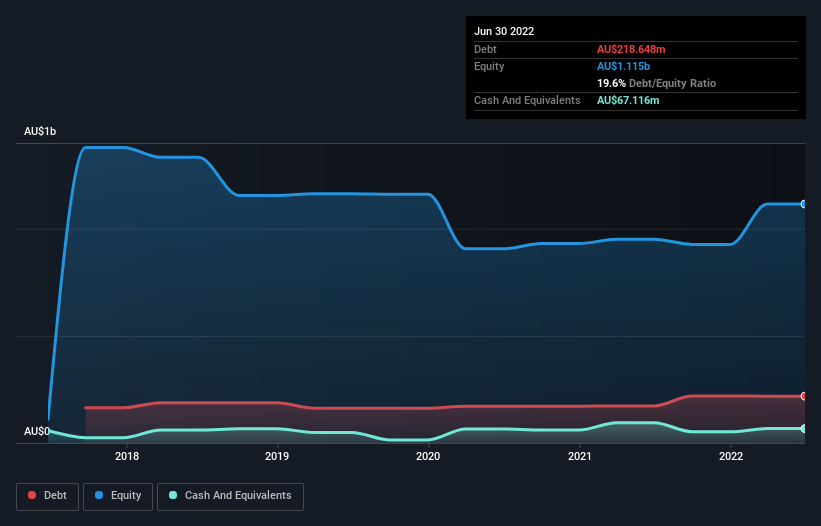Domain Holdings Australia (ASX:DHG) Seems To Use Debt Rather Sparingly
Warren Buffett famously said, 'Volatility is far from synonymous with risk.' So it might be obvious that you need to consider debt, when you think about how risky any given stock is, because too much debt can sink a company. We note that Domain Holdings Australia Limited (ASX:DHG) does have debt on its balance sheet. But the real question is whether this debt is making the company risky.
What Risk Does Debt Bring?
Generally speaking, debt only becomes a real problem when a company can't easily pay it off, either by raising capital or with its own cash flow. Ultimately, if the company can't fulfill its legal obligations to repay debt, shareholders could walk away with nothing. While that is not too common, we often do see indebted companies permanently diluting shareholders because lenders force them to raise capital at a distressed price. Of course, debt can be an important tool in businesses, particularly capital heavy businesses. The first thing to do when considering how much debt a business uses is to look at its cash and debt together.
See our latest analysis for Domain Holdings Australia
What Is Domain Holdings Australia's Debt?
As you can see below, at the end of June 2022, Domain Holdings Australia had AU$218.6m of debt, up from AU$173.1m a year ago. Click the image for more detail. On the flip side, it has AU$67.1m in cash leading to net debt of about AU$151.5m.

How Healthy Is Domain Holdings Australia's Balance Sheet?
We can see from the most recent balance sheet that Domain Holdings Australia had liabilities of AU$92.9m falling due within a year, and liabilities of AU$321.5m due beyond that. Offsetting these obligations, it had cash of AU$67.1m as well as receivables valued at AU$60.0m due within 12 months. So it has liabilities totalling AU$287.3m more than its cash and near-term receivables, combined.
Since publicly traded Domain Holdings Australia shares are worth a total of AU$2.16b, it seems unlikely that this level of liabilities would be a major threat. But there are sufficient liabilities that we would certainly recommend shareholders continue to monitor the balance sheet, going forward.
In order to size up a company's debt relative to its earnings, we calculate its net debt divided by its earnings before interest, tax, depreciation, and amortization (EBITDA) and its earnings before interest and tax (EBIT) divided by its interest expense (its interest cover). This way, we consider both the absolute quantum of the debt, as well as the interest rates paid on it.
We'd say that Domain Holdings Australia's moderate net debt to EBITDA ratio ( being 2.0), indicates prudence when it comes to debt. And its commanding EBIT of 12.2 times its interest expense, implies the debt load is as light as a peacock feather. Also relevant is that Domain Holdings Australia has grown its EBIT by a very respectable 27% in the last year, thus enhancing its ability to pay down debt. When analysing debt levels, the balance sheet is the obvious place to start. But it is future earnings, more than anything, that will determine Domain Holdings Australia's ability to maintain a healthy balance sheet going forward. So if you want to see what the professionals think, you might find this free report on analyst profit forecasts to be interesting.
Finally, a company can only pay off debt with cold hard cash, not accounting profits. So it's worth checking how much of that EBIT is backed by free cash flow. Over the last three years, Domain Holdings Australia recorded free cash flow worth a fulsome 90% of its EBIT, which is stronger than we'd usually expect. That positions it well to pay down debt if desirable to do so.
Our View
Domain Holdings Australia's interest cover suggests it can handle its debt as easily as Cristiano Ronaldo could score a goal against an under 14's goalkeeper. And that's just the beginning of the good news since its conversion of EBIT to free cash flow is also very heartening. Overall, we don't think Domain Holdings Australia is taking any bad risks, as its debt load seems modest. So the balance sheet looks pretty healthy, to us. There's no doubt that we learn most about debt from the balance sheet. But ultimately, every company can contain risks that exist outside of the balance sheet. Be aware that Domain Holdings Australia is showing 1 warning sign in our investment analysis , you should know about...
Of course, if you're the type of investor who prefers buying stocks without the burden of debt, then don't hesitate to discover our exclusive list of net cash growth stocks, today.
New: Manage All Your Stock Portfolios in One Place
We've created the ultimate portfolio companion for stock investors, and it's free.
• Connect an unlimited number of Portfolios and see your total in one currency
• Be alerted to new Warning Signs or Risks via email or mobile
• Track the Fair Value of your stocks
Have feedback on this article? Concerned about the content? Get in touch with us directly. Alternatively, email editorial-team (at) simplywallst.com.
This article by Simply Wall St is general in nature. We provide commentary based on historical data and analyst forecasts only using an unbiased methodology and our articles are not intended to be financial advice. It does not constitute a recommendation to buy or sell any stock, and does not take account of your objectives, or your financial situation. We aim to bring you long-term focused analysis driven by fundamental data. Note that our analysis may not factor in the latest price-sensitive company announcements or qualitative material. Simply Wall St has no position in any stocks mentioned.
About ASX:DHG
Domain Holdings Australia
Engages in the real estate media and technology services business in Australia.
Proven track record with adequate balance sheet.
Similar Companies
Market Insights
Community Narratives



